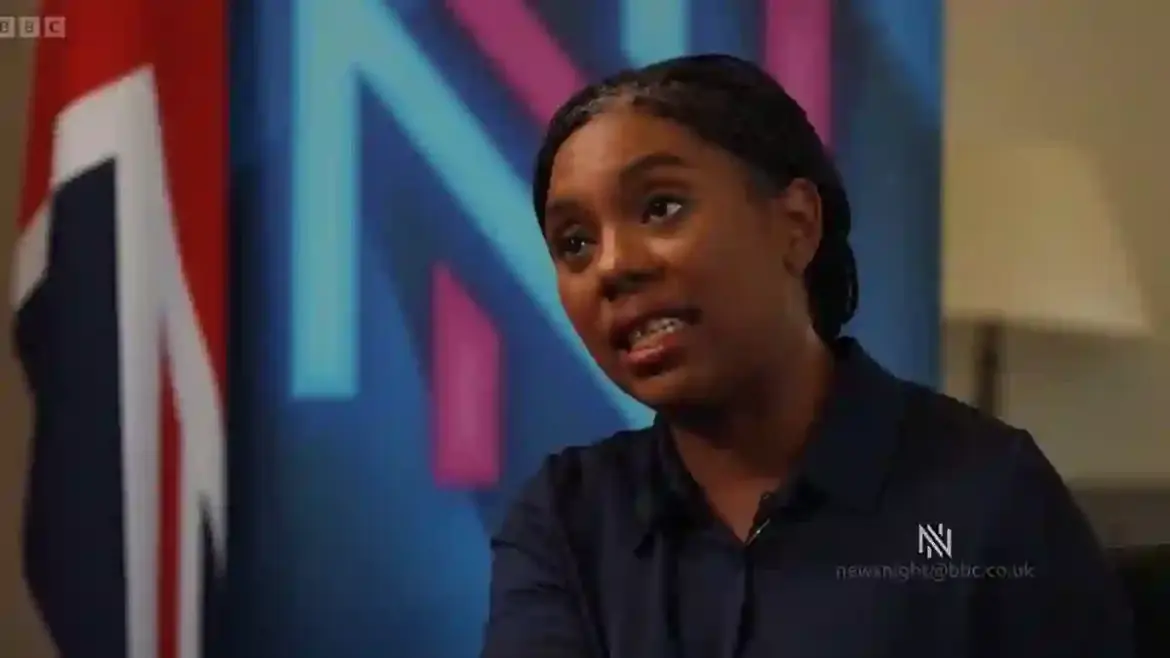Britain has been here before—facing tough economic times, high borrowing costs, and questions about whether the government has a solid plan to steady the ship.
Now, some politicians and business leaders are warning that the UK could once again be drifting toward the kind of financial crisis last seen in the 1970s.
At the center of the debate is whether Prime Minister Keir Starmer’s Labour government has a clear enough strategy for growth, or if the country risks sliding into deeper financial trouble.
Badenoch Raises the Alarm
Conservative leader Kemi Badenoch didn’t hold back when speaking to BBC’s Newsnight.
She said she was “really worried” that Britain could end up begging the International Monetary Fund (IMF) for help—just like it did in 1976 when then-chancellor Denis Healey had to ask for emergency funds as debt soared and the pound collapsed.
Badenoch argued that Labour came into office assuming the economy would simply improve under their watch.
“That is not working,” she said. “They need to get a plan to grow our economy, otherwise we will end up going to the IMF cap in hand.”
The Pressure on Rachel Reeves
Chancellor Rachel Reeves has been under growing scrutiny after reports suggested she faces a £50 billion “black hole” in the public finances.
She has tried to play down these claims and dismiss talk of major tax rises in her next Budget.
But Badenoch is convinced Reeves is heading in the wrong direction, warning that the government risks creating what she calls a “tax doom loop”—raising taxes, stifling business confidence, and still watching the deficit climb.
A Dire Warning from Business Leaders
It’s not just Tory politicians sounding the alarm.
Lord Stuart Rose, the former boss of Asda and Marks & Spencer, told Times Radio that Britain is “genuinely at the edge of a crisis.”
He stressed that without growth, the UK cannot create wealth, and without wealth, it cannot pay for the public services voters expect.
“We should all be worried about the state of Britain today,” Rose warned.
Conservatives Offer Cooperation—With Conditions
In her speech to the City of London, Badenoch is expected to urge the Prime Minister to work with her on cutting welfare spending rather than hiking taxes. She’ll frame this as a “national interest” offer, saying the Conservatives would back serious efforts to reduce costs but warning it’s not a “blank cheque.”
“We’re offering to work together to bring welfare spending down,” she said, “so that we can avoid crushing tax rises and higher inflation.”
Labour sources, however, brushed off the gesture, calling it little more than “a gimmick.”
A New Power Player in Welfare Reform
Meanwhile, Labour’s recent reshuffle brought in Pat McFadden as the new Work and Pensions Secretary, a role now expanded into a “super ministry” with responsibility for both welfare and skills.
Seen as Starmer’s trusted fixer, McFadden has sparked speculation that the Prime Minister may attempt fresh welfare reforms after abandoning earlier plans due to rebellion on his own benches.
In a call with staff, McFadden said one of his priorities will be tackling the growing number of young people not in education, work, or training.
He stressed the need to expand access to skills and training to reduce dependency on benefits.
The Two-Child Benefit Cap Debate
Badenoch is also expected to recommit the Conservatives to maintaining the two-child benefit cap, a controversial policy that limits welfare payments to families with more than two children.
Labour faces increasing pressure from its own MPs and the public to scrap the cap, while Reform UK has already promised to abolish it entirely.
The issue is likely to fuel more heated debate in the months ahead.
Bond Market Jitters Add to the Tension
Underlying all of this are the financial markets.
Just last week, the cost of long-term government borrowing hit its highest level since 1998 amid fears about public finances and global uncertainty.
Although bond yields have since eased back, the spike highlighted just how fragile investor confidence in Britain can be.
Badenoch and her allies argue this is yet another warning sign that Labour must act decisively—or risk a deeper financial storm.
What Comes Next?
As Reeves prepares for her second Budget in November, the pressure is mounting.
Labour must find a way to balance demands for better public services with fears of over-taxation and ballooning debt.
Meanwhile, the Conservatives are trying to position themselves as a credible alternative voice on fiscal discipline and growth.
With both sides trading warnings and accusations, one thing is clear: the economic debate is only just beginning, and Britain’s financial stability hangs in the balance.
